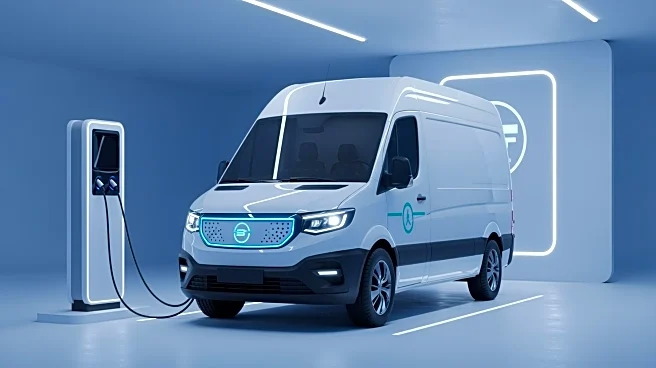What's Happening?
DHL Express US has announced the introduction of its first Mercedes-Benz eSprinter vans in the United States, marking a significant step in expanding its electric vehicle fleet. The company has ordered
45 eSprinter vans, which will be supported by new EV charging stations at facilities in Illinois, Indianapolis, Pennsylvania, and New Jersey. This move is part of DHL's broader strategy to electrify 66% of its last-mile delivery fleet by 2030. Despite the expiration of the federal tax credit for electric vehicles, DHL is committed to reducing its carbon footprint and improving air quality in urban areas. The eSprinter vans offer a battery range exceeding 240 miles, making them suitable for both inner-city logistics and longer delivery routes.
Why It's Important?
The expansion of DHL's electric vehicle fleet in the US is a critical development in the logistics industry, especially as federal support for electric vehicles wanes. By investing in electric vehicles and charging infrastructure, DHL is positioning itself as a leader in sustainable logistics, potentially influencing other companies to follow suit. This transition not only supports environmental goals but also enhances operational efficiency and reliability. The move could have significant implications for urban air quality and the broader adoption of electric vehicles in the logistics sector, setting a precedent for other companies to prioritize sustainability despite changing federal policies.
What's Next?
DHL's commitment to electrifying its fleet suggests continued investment in electric vehicles and infrastructure in the US. As the company scales its use of electric vehicles, it may influence policy discussions and industry standards regarding sustainable logistics practices. The introduction of wireless charging technology and Charging-as-a-Service platforms could further accelerate the transition to electric fleets, offering fleet owners cost-effective solutions to bypass grid bottlenecks. DHL's actions may prompt other logistics companies to reevaluate their strategies and invest in similar technologies to remain competitive in a rapidly evolving market.
Beyond the Headlines
The shift towards electric vehicles in logistics highlights broader ethical and environmental considerations, such as corporate responsibility in reducing carbon emissions and improving public health. DHL's initiative may encourage other companies to adopt sustainable practices, potentially leading to long-term shifts in industry standards and consumer expectations. The integration of wireless charging and self-driving technology could redefine logistics operations, emphasizing convenience, safety, and efficiency. This transition may also influence cultural perceptions of corporate sustainability and the role of businesses in addressing climate change.









